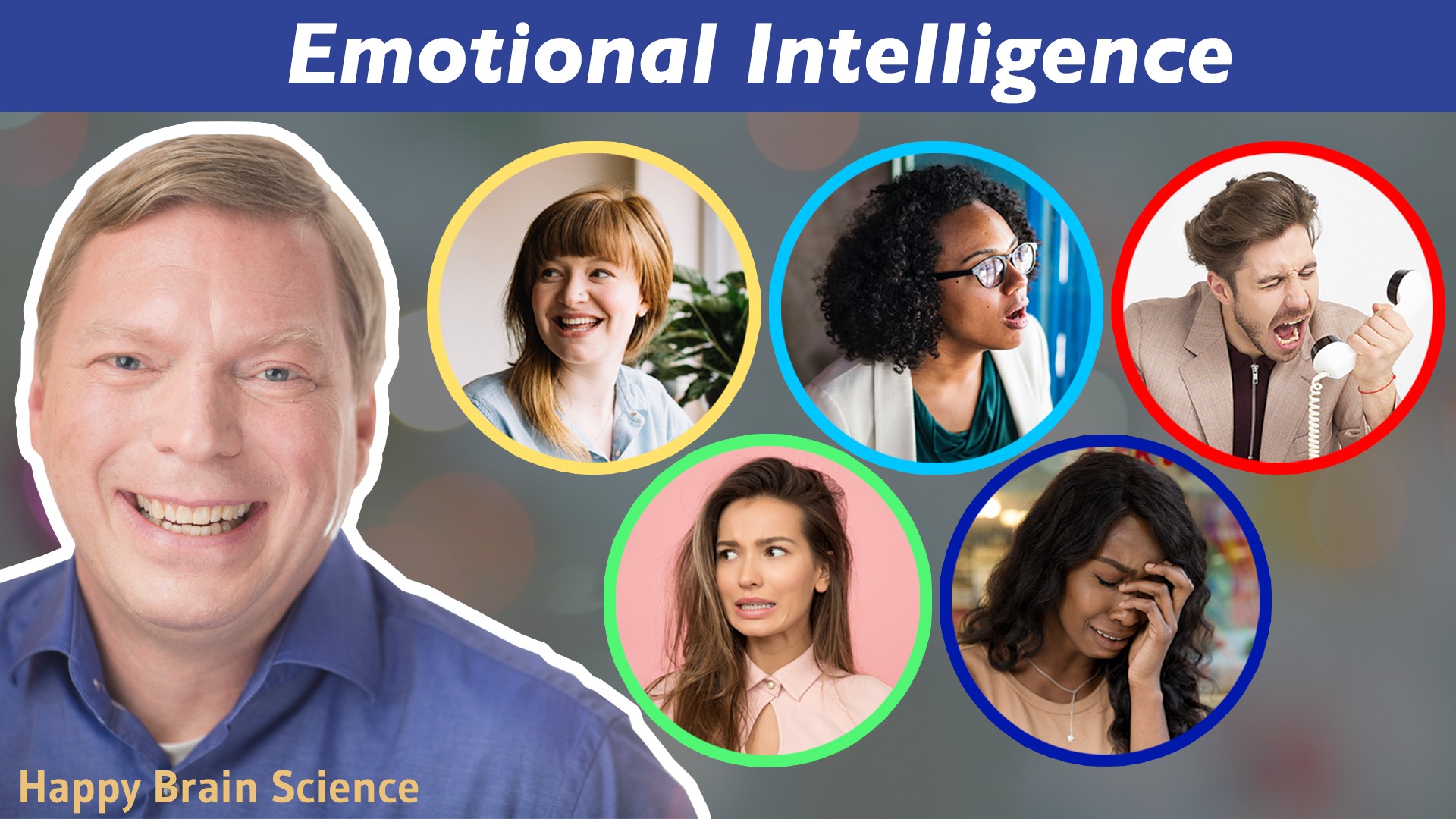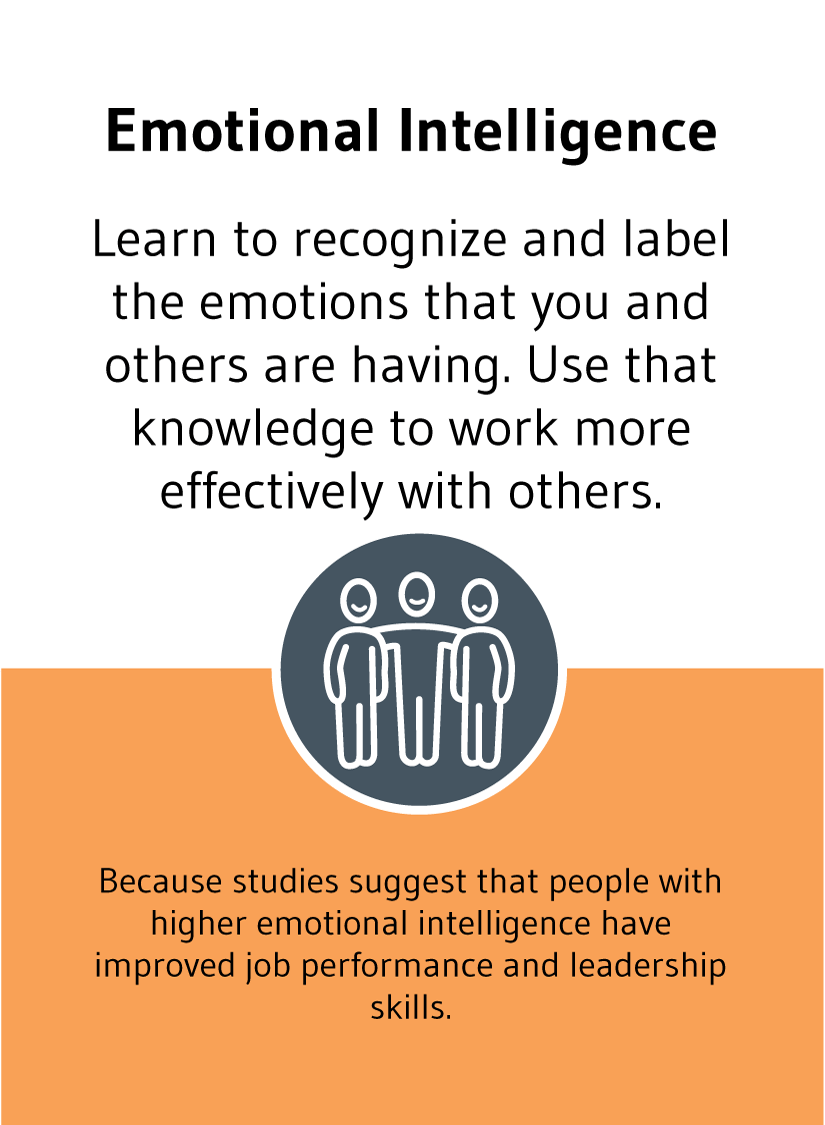
Boost Your Emotional Intelligence at Work
How to Work Better with People: Emotional Intelligence
Come play with us! Join Scott Crabtree, CEO of Happy Brain Science, on a journey through 100+ science-based solutions from our Choose Happiness @ Work card game! In this episode, discover why boosting emotional intelligence can help you work more effectively with others.
***Continue reading or skip to the bottom to watch this post as a video***

This Choose Happiness @ Work card says, “Emotional Intelligence: Learn to recognize and label the emotions that you and others are having. Use that knowledge to work more effectively with others. Because studies suggest that people with higher emotional intelligence have improved job performance and leadership skills.” And furthermore, emotional intelligence is important to the quality of your relationships, which is important to your happiness, which is important to your success at work.
So if you’d like to be successful, boost your emotional intelligence. I humbly suggest that some of us are not as emotionally intelligent as we think. In my workshop “Collaboration through Candid Conversation,” we’re focused on difficult conversations that can be emotional.
Skillfully navigating those difficult conversations is roughly a gazillion times easier said than done. Which is why I have a whole section in that workshop titled “Boost Emotional Intelligence to Boost Success.”
How Accurate is Your Emotional Intelligence?
I like to customize workshops, so I often survey people ahead of time. “I am knowledgeable and skillful at using emotional intelligence in difficult conversations” is a statement that I ask people to agree or disagree with, and often I get very high agreement: “Oh, yeah, I got this nailed.”
And then I show them a science-based quiz that you can find online. It’s an emotional intelligence quiz from the Greater Good Science Center out of Berkeley University in California. It’s a wonderful quiz. It has photographs of people’s emotions, and then 4 emotions those people might be having.
In the workshop I ask people, “OK, show me, is this woman feeling: 1. embarrassment, 2. surprise, 3. physical pain, or 4. entitlement (something like that)?” And I say, “OK, we’re gonna do this with fingers — so 1, 2, 3: Show me what you think she’s feeling.” And often we get a bunch of different fingers up in the room. So first of all, I tell people, “Look around. Some of you are wrong.”
“So don’t be so sure in a difficult conversation that you’re right about what the other person is feeling. If you thought you were always right about labeling other people’s emotions, some of you are wrong.” That quiz is great because it shows you what emotions look like on faces — tells you why you are right or wrong.
“The Soft Stuff Is the Hard Stuff”
Learning to correctly label, with a rich vocabulary, the emotions that you and other people are having is a great first step to emotional intelligence. In short, the rest of emotional intelligence is working skillfully inside that emotional context once you have that emotional information. What do you do to take care of yourself and a dialogue partner, given the emotional states that you’re having?
If this sounds touchy-feely to you — if this sounds like “the soft stuff” — well, I had the pleasure of working with a VP of HR at HP (that’s Vice President of Human Resources at Hewlett Packard) who said, “The soft stuff is the hard stuff.” If you work in a technical field, as I have, you might think, “Oh, these technical challenges are really tough.” In my experience, the toughest challenges by far are working with other human beings. We are infinitely complex and can be very challenging to work with.
Emotional intelligence can help you work effectively with other people, and boost your relationships, therefore happiness, therefore success. Thanks for choosing happiness with me.
We’d love to know what you think! What strategies have you used to level up your emotional intelligence? Please comment below!
(This post is part of a series about science-based solutions featured in our card game & facilitation tool, Choose Happiness @ Work.)